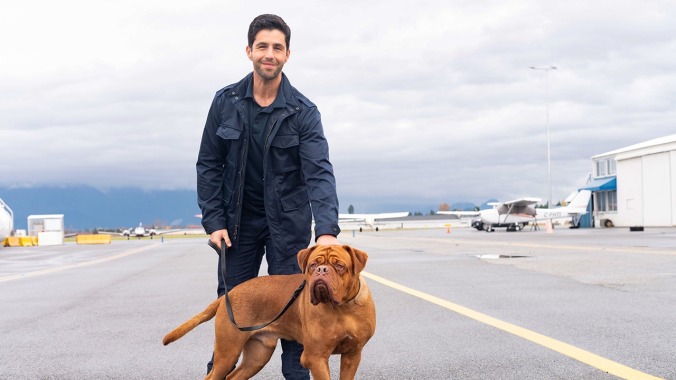Disney Plus’ Turner & Hooch sequel series bites off more than it can chew
It's a Hanks-less job, but somebody's got to do it


In the year and a half since its launch, Disney+ has mostly stuck to the familiar, ordering up a slate of Marvel and Star Wars spin-offs, and reviving well-known franchises like The Mighty Ducks and High School Musical. Along with behind-the-scenes looks at these series with built-in fanbases, there have been a few true originals, including reality competition series Encore! and scripted sports drama Big Shot. But it’s just too darn easy for the streamer to pull a title from its coffers of existing IP and give it the reboot or spin-off treatment. With the legacy sequel Turner & Hooch, Disney+ takes another shot at a TV spin-off of Roger Spottiswoode’s 1989 film of the same title.
This buddy-canine action-comedy, from Burn Notice and The Gifted creator Matt Nix, picks up decades after the movie, though that hardly makes a difference. Turner & Hooch re-creates many of the particulars of its namesake, right down to the character names and “ambitious cop who doesn’t have time for a dog or much else” storyline. Okay, there are a few deviations—the protagonist is once more named Scott Turner (Josh Peck), but he’s a U.S. Marshal based in San Francisco, California, not a Cypress Beach police investigator. This Scott also gets a dog named Hooch (played by five French mastiffs, instead of one slobbery charmer named Beasley) who promptly destroys his pristine apartment, only the pooch is a gift from his late father—also named Scott Turner, played by Tom Hanks in the original movie—not the faithful companion of one of his oldest friends.
Scott doesn’t actually have time for friends or even his sister Laura (Lyndsy Fonseca) and mom Emily (Sheila Kelley, taking over for Mare Winningham). He’s been distancing himself from his family since before Scott’s (that is, his father) death, somewhat embarrassed that his old man was content to “write tickets on the beach” after having solved the biggest case in the town’s history. This is all communicated through graceless exposition, as the story never centers on Scott, Laura, and Emily long enough to give us a sense of their dynamic. Instead, everyone’s defined by a trait: Scott is orderly, Laura is flaky (but only so she can be his opposite), and Emily is a veterinarian, who really should know better than to foist a dog on someone who’s made it very clear they don’t want a dog or have time to look after one.
Given what an uptight goober her son is, it would be an understandable act of revenge—Laura certainly seems to get a kick out of dropping the dog off unexpectedly—but no, Hooch is supposed to teach Scott to slow down and enjoy life, lessons he apparently did not get growing up. The memory of Scott’s father looms over the proceedings, his Hanks-ness sorely missed, and not just by the family. It’s revealed that he was working on one final case, which he kept hidden from his wife for some reason, even though she seems unfazed by even his death. We’re not suggesting she had anything to do with his passing; it’s made pretty clear that he had a heart attack, and that his dying wish was that his son learn love and trust from a dog. But there’s a lot about the Turner family that goes unaddressed, despite the 40-plus-minute episode runtimes. In that time, Turner & Hooch could deliver a solid family dramedy or a mindless action-comedy; by trying to be both, the show ends up neither.
With things so listless and unexplored at home, there’s a lot riding on Scott’s work, both for Scott and the show. But his job is just as loosely defined and dependent on references—the bad guys are knockoffs of goons from ’80s and ’90s buddy-cop movies, while the people in the U.S. Marshal’s office are echoes of their law-enforcing counterparts. As Scott’s more senior partner, Jessica Baxter (Carra Patterson) is getting too pregnant for this… crap. His boss, James Mendes (Anthony Ruivivar), glowers and gives grudging “attaboys” when Scott does something right, which is usually thanks to Hooch, who has better instincts than all the badge-toting bipeds.
The series can’t figure out whether it wants to play these scenes straight, or laugh about the fact that Hooch is often the smartest person in the room. Nix previously showed a much stronger grasp of action and humor in the zippy semi-procedural Burn Notice, but here, he can’t get a handle on what kind of story he wants to tell. Turner & Hooch aims to be a continuation of the PG-13 Touchstone film, but not in tone, which would make it stick out in its virtual home. It also wants to be all-ages entertainment, even as people hurl themselves through windows, shoot at each other, and run through warehouse fires.
The lack of a clear objective also leaves the cast, including Peck, looking lost, though that may be a result of the choppy editing and strange blocking, which often gives the impression that the dog isn’t in the scene with his human counterparts. (Maybe it was all the drooling and urinating.) Reginald VelJohnson reprises his role as David Sutton—a former detective, now the mayor of Cypress Beach—but only so he can vaguely reminisce about the old days. His presence does lend credence to the Die Hard homage in the second episode, the stylistic high point of the series.
Turner & Hooch doesn’t have enough punch to be Michael Bay for TV (though McG does his best to blow up everything in sight in the pilot episode), nor does the show assert itself as a family sitcom. This legacy sequel might have worked better, if just barely, if Nix had actually remade the film—no one wants to have to replace Tom Hanks as a Tom Hanks character, but at least the show would have a sense of direction.